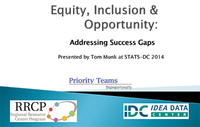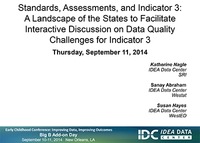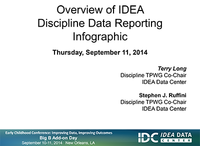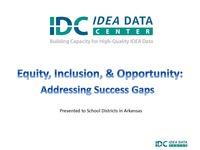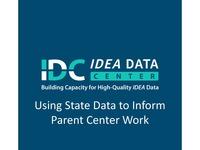Archived Resources
The Resource Library houses tools and products that were developed by IDC, developed with its collaborators, or submitted by IDC stakeholders. Search and filtering tools are available to help users navigate through the library.
Archived Resources 1 - 7 of 79
Format: Presentations
Equity, Inclusion and Opportunity: Addressing Success GapsThe presentation introduces a research-based guidance document and self-assessment rubric designed to help districts and schools identify the root causes of "success gaps" (for example, in test scores, suspension or graduation rates, or course credits) for some groups of students, thereby helping schools to improve and equalize results for all students.
Format: Presentations
Standards, Assessments, and Indicator 3: A Landscape of the States to Facilitate Interactive Discussions on Data Quality Challenges for Indicator 3Members of IDC's Tools and Products Assessment workgroup presented an overview of states and entities across several pertinent variables: a) current information on each state's standards, current state assessments, and assessment plans; and b) 2011-12 information on Part B Indicator 3. Presenters conducted an interactive discussion identifying data quality issues around Indicator 3 and solicited suggestions for tools and products to improve data quality for this indicator.
Format: Presentations
Overview of IDEA Discipline Data Reporting InfographicThe presentation reviewed a new TA tool that summarizes the basics of reporting IDEA discipline data in the six EDFacts file formats. Presenters described and demonstrated the new IDC infographic, discussed how SEAs and LEAs can use it to improve the quality of their discipline data, and requested audience input.
Format: Presentations
Equity, Inclusion, and Opportunity in Special EducationIn this webinar, which IDC staff presented for the University of Tennessee’s Boling Center for Developmental Disabilities, we first discuss the requirements in the IDEA related to disproportionality, describe methods for calculating disproportionality, and present data, both at the national level and for the state of Tennessee. The second part of the webinar introduces a research-based guidance document and self-assessment rubric designed to help schools and districts identify the root causes of "success gaps."
Format: Recordings
Equity, Inclusion, and Opportunity in Special Education WebinarIn this webinar, which IDC staff presented for the University of Tennessee’s Boling Center for Developmental Disabilities, we first discuss the requirements in the IDEA related to disproportionality, describe methods for calculating disproportionality, and present data, both at the national level and for the state of Tennessee. The second part of the webinar introduces a research-based guidance document and self-assessment rubric designed to help schools and districts identify the root causes of "success gaps."
Format: Presentations
Equity, Inclusion, & Opportunity: Addressing Success GapsThis presentation introduced the audience of local education agency personnel to new tools, the Equity, Inclusion, and Opportunity: How to Address Success Gaps Rubric and the Equity, Inclusion and Opportunity: How to Address Success Gaps White Paper. The rubric and white paper were developed by a group of OSEP-funded technical assistance providers, with input from states and other experts. The Equity, Inclusion, and Opportunity: How to Address Success Gaps tools provide a process for reducing the differences in school success among subgroups of students by providing a structure for districts or schools to examine their current practices and identify areas for improvement.
Format: Presentations
Using State Data to Inform Parent Center WorkThe purpose of this presentation was to introduce PTI and CPRC directors and staff to the IDEA data collected and reported by state education agencies and discuss how these data can be used to inform many of the fourteen priority topics for the PTI/CPRC network. These priorities were identified in the most recent OSEP requests for proposals for PTI and CPRC funding.


